Kenneth L. Gentry Jr.'s Blog, page 42
October 29, 2021
AUGUSTINE’S POSTMILL OPTIMISM
 PMW 2021-078 by Kenneth L. Gentry, Jr.
PMW 2021-078 by Kenneth L. Gentry, Jr.
Modern postmillennialism is the result of a growing understanding of biblical eschatology. And though it undergoes much systematization from its nascent beginnings to the present, in its most basic form, clear adumbrations of it appear in antiquity.
Scholarly Analysis
Most scholars would agree with Millard J. Erickson that “all three millennial positions have been held virtually throughout church history” (he collapses dispensationalism into premillennialism in mentioning only three basic views) (Erickson, Christian Theology, 1212). Robert G. Clouse writes: “Whereas the other strains of millennialism all have deep roots in the history of the church, the dispensational variety is of recent origin” (Clouse, et al. New Millennial Manual, 56). Donald G. Bloesch goes even farther: “Postmillennialism has been present throughout Christian history” (Bloesch, Last Things, 102).
Augustine (AD 354–430) looms as the greatest Christian thinker in the early church and one of the greatest of all time. Originally a premillennialist, Augustine turned away from the system (Augustine, Sermons, 259; City of God 20:7). Many assume his views correspond more closely with amillennialism, some rather strong evidence of postmillennial-type thinking appears in his writings, as various scholars note. See:
John O’Meara, “Introduction,” in Augustine, City of God, viii.
S. LaSor, The Truth About Armageddon, 160.
David W. Bebbington, Patterns in History, 54.
Adolf von Harnack, “Millennium,” Encyclopedia Britannica (9th ed.) 16:314ff.
Thomas N. Finger, Christian Theology, 113–115.
Gary North, Millennialism and Social Theory, 19, 22, 161, 239.
Loraine Boettner, Millennium, 10.
Paul Erb, Bible Prophecy, 101–102.
Even Walvoord is aware of these tendencies in Augustine: Millennial Kingdom, 8.
According to religion journalist Wendy Zoba, Augustine believes that history “would be marked by the ever-increasing influence of the church in overturning evil in the world before the Lord’s return” (Zoba, “Future Tense,” Christianity Today [October 2, 1995]), 20).
He Shall Have Dominion
(paperback by Ken Gentry)
A classic, thorough explanation and defense of postmillennialism (600 pages).
See more study materials at: www.KennethGentry.com
Literary Evidence
Several statements in Book 18 of The City of God certainly express a postmillennial-like optimism. Of Nahum 1:14 and 2:1 Augustine states:
Moreover, we already see the graven and molten things, that is, the idols of the false gods, exterminated through the gospel, and given up to oblivion as of the grave, and we know that this prophecy is fulfilled in this very thing. (City of God 18:31)
“The tents of Ethiopia shall be greatly afraid, and the tents of the land of Midian;” that is, even those nations which are not under the Roman authority, being suddenly terrified by the news of Thy wonderful works, shall become a Christian people. “Wert Thou angry at the rivers, O Lord? or was Thy fury against the rivers? or was Thy rage against the sea?” This is said because He does not now come to condemn the world, but that the world through Him might be saved. (City of God, 18:32)
Augustine comments on Haggai 2:6:
“Thus saith the Lord of hosts, Yet one little while, and I will shake the heaven, and the earth, and the sea, and the dry land; and I will move all nations, and the desired of all nations shall come.” The fulfillment of this prophecy is in part already seen, and in part hoped for in the end. . . . so we see all nations moved to the faith; and the fulfillment of what follows, “And the desired of all nations shall come,” is looked for at His last coming. For ere men can desire and wait for Him, they must believe and love Him.” (City of God, 18:35)
We may also reference his comments on Psalm 2. Regarding the Lord laughing at the nations (Ps 2:4) he writes: “it is to be understood of that power which he giveth to His saints, that they seeing things to come, namely, that the Name and rule of Christ is to pervade posterity and possess all nations.” At v. 7 he writes: “‘Ask of Me,’ may be referred to all this temporal dispensation, which has been instituted for mankind, namely, that the ‘nations’ should be joined to the Name of Christ, and so be redeemed from death, and possessed by God. ‘I shall give Thee the nations for Thine inheritance,’ which so possess them for their salvation, and to bear unto Thee spiritual fruit” (Augustine in Nicene and Post-Nicene Father 8:3).
Postmillennialism Made Easy (by Ken Gentry)
Basic introduction to postmillennialism
See more study materials at: www.KennethGentry.com
In one of his sermons he proclaims:
Lately, kings are coming to Rome. A great thing, brothers, in what manner it was fulfilled. When it was spoken, when it was written, nothing of these things was. It is extraordinary! Pay attention and see; rejoice! May they be curious who do not want to give attention to it; for these things we want them to be curious. . . . Let them discover that so many things which they see of late were predicted beforehand. . . . Every age [of individual] has been called to salvation. Every age has already come — every dignity, every level of wealth and human capacity. Soon let them all be inside. Presently a few remain outside and still argue; let them wake up at some time or another to the rumbling of the world: the whole world clamor.
(Cited in John A. Maxfield, “Divine Providence, History, and Progress in Augustine’s City of God,” Concordia Theological Journal 66:4 [October 2002], 340–41.
Free Gentry sermon for listening or downloading: “The Future Hope of Christ’s Church“
Indeed, Augustine taught that history would eventually issue forth in a “future rest of the saints on earth” (Sermon 259:2) “when the Church will be purged of all the wicked elements now mixed among its members and Christ will rule peacefully in its midst” (Brian Daley, Hope of the Early Church, 133).
Interpretive Caution
I must provide a cautionary word here: I am not claiming that Augustine is a full-blown postmillennialist. I am simply pointing out elements in his views that suggest a postmillennial-like optimism. He is one of the “adumbrations” of postmillennialism “in its simplest form,” as I state above.
October 26, 2021
WHITBY AND POSTMILLENNIALISM
 PMW 2021-079 by Kenneth L. Gentry, Jr.
PMW 2021-079 by Kenneth L. Gentry, Jr.
Most dispensationalists are quite confused regarding the origins of postmillennialism. Hal Lindsey has as confidently declared its modern origins as he has the latest date for the Rapture: “There is no evidence of the distinctive teachings of Postmillennialism earlier than the seventeenth century.”
Charles Baker states: “Its advocates admit that it was first taught in the seventeenth century.” In fact, many dispensationalists wrongly assume that we may trace postmillennialism back only as far as Daniel Whitby in 1703.
L. S Chafer alleged that Whitby was “the originator of what is known as postmillennialism.”
Mal Couch puts in the Bible notes of the Prophecy Study Bible: “This view was first propagated by Daniel Whitby (AD 1638–1726), a Unitarian.”
Postmillennialism Made Easy (by Ken Gentry)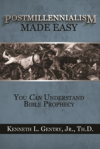
Basic introduction to postmillennialism. Presents the essence of the postmillennial argument and answers the leading objections. And all in a succinct, introductory fashion.
See more study materials at: www.KennethGentry.com
And this was Thomas Ice’s original view:
“Daniel Whitby first put forth his view in a popular work entitled Paraphrase and Commentary on the New Testament (1703). It was at the end of this work that he first set forth what he calls in his own words ‘A New Hypothesis’ on the millennial reign of Christ. Thus, the system called postmillennialism was born in the early 1700s as a hypothesis. Whitby and his modern followers present their arguments and explanations based upon unproved assumptions — assumptions resulting in a hypothesis rather than something which is the fruit of the study of Scripture or even the voice of the church.”
Fortunately Ice came to recognize his error, for in a later work he acknowledged regarding the Whitby argument: “this does not mean that elements of systematic postmillennialism did not exist prior to Whitby, for they clearly did.”
Whitby was not the founder of postmillennialism — even of its more systematic, modern expression. Rodney Peterson writes that prior to Whitby “this perspective had undergone changes, particularly since Thomas Brightman (1562–1607).”
Saving Freedom
(by Sen. Jim DeMint)
(Former) Senator DeMint’s firsthand account of the unsettling socialist shift—behind-the-scenes actions in Congress that are changing the character of our nation.
See more study materials at: www.KennethGentry.com
Amillennialist Venema agrees. Brightman, who died in 1607, was one of the fathers of Presbyterianism in England. He sets forth his postmillennial views in detail in his book, A Revelation of the Revelation. In fact, according to Venema, many consider this work the “most important and influential English revision of the Reformed, Augustinian concept of the millennium,” “one of the most influential of the Puritan expositors of Revelation.” This was a century before Whitby’s 1703 article. Ball categorically denies Whitby’s foundational role. Whitby was simply not the “founder” of postmillennialism; he was a modern system-atizer. He was helpful in “popularizing” postmillennialism because he present postmillennialism’s “most influential formulation” to date.
October 19, 2021
THE MILLENNIUM EXAGGERATED (2)
 PMW 2021-079 by Kenneth L. Gentry, Jr.
PMW 2021-079 by Kenneth L. Gentry, Jr.
This is the second and concluding study on the exaggerated role of the millennium in eschatological studies. It is important for you to read the preceding article before jumping into this one. I am arguing that John’s half-chapter is given too much place in prophetic discussions. This has led many Christians to misunderstand the function of the millennium in Revelation, as well as its length.
Properly understood, the thousand-year time frame in Revelation 20 represents a long and glorious era and is not limited to a literal 365,000 days. The figure represents a perfect cube of ten, which is the number of quantitative perfection (as Augustine argues long ago). The thousand here is no more literal than that which affirms God’s ownership of the cattle on a thousand hills (Ps 50:10), or promises Israel will be a thousand times more numerous (Dt 1:11), or measures God’s love to a thousand generations (Dt 7:9), or expresses the desire for a thousand years in God’s courts (Ps 84:10), or compares a thousand years of our time to one of God’s days (Ps 90:4). Terry even surmises that “it may require a million years.”
Blessed Is He Who Reads: A Primer on the Book of Revelation
By Larry E. Ball
A basic survey of Revelation from the preterist perspective. It sees John as focusing on the destruction of Jerusalem and the temple in AD 70.
See more study materials at: www.KennethGentry.com
The millennial designation, then, is John’s visionary portrayal of Christ’s kingdom, which the Lord establishes at his first coming. Revelation 20:1 clearly presents the passage as a vision; John opens with: “and I saw” (Rev 20:1a). This strongly suggests its symbolic import and is evidence against a strictly literal interpretation of the one thousand years. In addition, the first event we see in the vision is Satan’s binding with a chain, which surely is not literal (especially since his binding appears as a spiritual event elsewhere: Mt 12:29). And what kind of key would unlock “the abyss” (Rev 20:1)? And where would it be kept? Surely the key is a symbol of control, as when Christ holds “the keys of death and of Hades” (Rev 1:18). May we really imagine that the Lord holds physical keys that control death and Hades?
Revelation 20:4–6 speaks of the saints living and reigning with Christ, which appears elsewhere as a spiritual reality in the present experience of God’s people (1Co 3:21–22; Eph 1:3; 2:6; Col 3:1–2). In Revelation 20:6 we read that “they will be priests of God and of Christ and will reign with Him for a thousand years,” whereas in Revelation 1:6 John applies this same imagery to John’s first century audience: “He has made us to be a kingdom, priests to His God and Father.” This reigning of the saints with Christ on thrones pictures the kingdom of Christ, which is already established (cf. ch. 10). His kingdom, then, is defined chronologically as a complete and perfect, long-lasting period. Warfield approvingly cites William Temple: “The church is still in its infancy. Two thousand years are as two days.” As James Adderley expresses it: “Christianity is a very young religion” and “we are only at the beginning of Christian history even now.”
Besides, elsewhere Christ’s second coming occurs at “the end” (1Co 15:23–24) and brings in “the last day” resurrection (Jn 6:39, 40, 44, 54). “Therefore, in view of the total absence of supporting evidence from the New Testament, it is exceedingly hazardous to claim that a thousand years intervene between Christ’s coming and the end of the world on the grounds that Revelation 20 teaches a millennium.”
The millennial era has already lasted almost 2,000 years; it may continue another 10,000 or more for all we know. It is the perfect time of Christ’s rule in his kingdom (Rev 1:5–6) — a time that shall eventually result in the subduing of all nations.
Now that we have had this two-part study of the abuse of the millennium: “Go. And sin no more.”
Click on the following images for more information on these studies:



October 15, 2021
THE EXAGGERATED MILLENNIUM (1)
 PMW 2021-076 by Kenneth L. Gentry, Jr.
PMW 2021-076 by Kenneth L. Gentry, Jr.
I am beginning a two-part series on the millennium. I will be highlighting how its significance in eschatological discussions is exaggerated. I am calling for balance on this issue.
Revelation 20:1–6 present us with a time frame that plays a far greater role in the eschatological debate than it warrants. Oddly, Stanley J. Grenz asserts of “evangelical postmillennialists” that “as a millenarian viewpoint, of course, it builds its primary case from a futurist interpretation of John’s vision.” This is simply not so. As I show in chapter 3 and argue in my chapter in Three Views on the Millennium and Beyond, “I would prefer to leave Revelation 20 out of my presentation.” In their debate book Antony Hoekema scolds postmillennialist Loraine Boettner for not dealing with Revelation 20:1–6 in his argument for postmillennialism.
Incredibly, this passage dominates the thinking of various eschatological schools. But amillennialist William Cox wisely argues: “Most millennial thinking begins with Revelation 20, since this is the only place in the entire Bible where the thousand years is mentioned. We feel that Revelation 20 ought to be our last stop, not our first.” Indeed, “this is one of the most hotly debated issues in the whole field of eschatology.” Grant Osborne reminds us that “few issues have divided the church for as long a time as this, for the church in the first three centuries had extensive debates over ‘chiliasm.’”
Adam in the New Testament
by J. P. Versteeg
Carefully examining key passages of Scripture, Versteeg proves that all human beings descended from Adam, the first man. He argues that if this is not true, the entire history of redemption documented in Scripture unravels and we have no gospel in any meaningful sense.
See more study materials at: www.KennethGentry.com
The role of Revelation 20 in the debate is absolutely essential to premillennialism. Historic premillennialist Timothy P. Weber notes that “the key biblical passage for such [golden age] speculation is Revelation 20, in which Christ returns to earth, defeats Satan, and sets up a thousand-year kingdom on the earth.” Premillennialist Craig L. Blomberg agrees: “for evangelical New Testament interpreters, the millen-nial debate reduces ultimately to an understanding of Revelation 20.” He notes that: “George Eldon Ladd . . . liked to say in class that he could have been an amillennialist if it were not for Revelation 20.”
Premillennialism’s depending on Revelation 20 is surprising for at least two major reasons. First, the only place in all of Scripture that associates “one thousand years” with the reign of Christ is in the first six verses of this one chapter. Against such a complaint, premillennialist Ladd comments: “the fact that the New Testament in only one place teaches an interim kingdom, between this age and the Age to Come is no reason for rejecting it.” Yet the postmillennial concern is well-justified. If a literal earthly millennium is a prominent era in redemptive history, the very goal of history (as premillennialists and dispensationalists argue), then why should we not expect a reference to the thousand years appearing in more than one passage?
Second, the thousand-year reign occurs in the most figurative and difficult book in all of Scripture. If it is a literal time frame, why is it that it is only mentioned in this highly symbolic book? It is a bit odd, too, that this time frame is a perfectly rounded and exact multiple of ten, which seems more compatible with a figurative view.
B. B. Warfield is surely correct when he comments: “we must not permit ourselves to forget that there is a sense in which it is proper to permit our understanding of so obscure a portion of Scripture to be affected by the clearer teaching of its more didactic parts. . . . The order of investigation should be from the clearer to the more obscure.” But dispensationalists and premillennialists seldom honor this hermeneutical principle. In fact, “nothing, indeed, seems to have been more common in all ages of the Church than to frame an eschatological scheme from this passage, imperfectly understood, and then to impose this scheme on the rest of Scripture vi et armis.”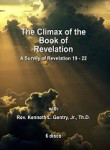
The Climax of the Book of Revelation (Rev 19-22)
Six lectures on six DVDs that introduce Revelation as a whole, then focuses on its glorious conclusion. Provides an important, lengthy Introduction to Revelation also.
See more study materials at: www.KennethGentry.com
Historic premillennialist Chung complains: “Many Reformed theologians . . . spiritualize key passages of the Bible that must be interpreted more literally from the kingdom perspective. For example, many Reformed covenant theologians have taken Revelation 20:1–6 as a metaphorical account, denying the fulfilment of the physical millennial rule on the earth.”
Robert Clouse well notes: “These categories [amillennial, premillennial, postmillennial], although helpful and widely accepted, are in certain respects unfortunate as the distinctions involve a great deal more than the time of Christ’s return.” Nevertheless, as I note above, amillennialist Hoekema scolds postmillennialist Boettner for not dealing with Reve-lation 20:1–6 in his presentation of the postmillennial conception of the kingdom.
To be continued. Don’t worry the Rapture hasn’t happened. I will be back.
Click on the following images for more information on these studies:
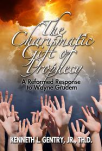

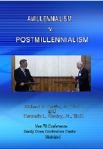
October 12, 2021
REV 11:2 AND ISRAEL CAST OUT (3)
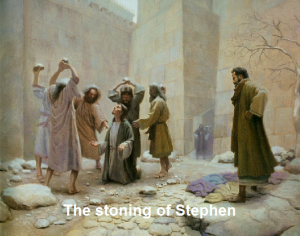 PMW 2021-075 by Kenneth L. Gentry, Jr.
PMW 2021-075 by Kenneth L. Gentry, Jr.
In this blog I continue the thought introduced in my last one. That is, I am continuing to show that Israel was excommunicated by God in AD 70. This is the third in a series on Rev 11:2, and the second in this two-part installment on excommunication. You will need to read the other installments for context.
Corporate Excommunication
The symbolic impact of the temple’s destruction should reinforce the theological reality of her corporate excommunication, for the loss of the temple indicates the removal of the favorable presence of God (2Ch 7:20; Jer 7:14–15). At the end of Rev we learn regarding “the [new] city” of God that “outside [exō] are the dogs” (22:15; cp. Php 3:2). After the vision of the temple’s call for destruction, John hears the seventh angel declare: “The kingdom of the world has become the kingdom of our Lord, and of His Christ; and He will reign forever and ever” (11:15b).
The fact that the temple system and the Jews are symbolized by the “outer court” is significant. Jesus applies the terms ekballe and exōthen (11:2) to the Jews who will be cast outside of God’s kingdom blessings. They will be cast out to where Gentiles dwell: “the sons of the kingdom shall be cast out [ekblēthēsontai] into the outer [exōteron based on exō and related to exōthen ] darkness” (Mt 8:12a; cp. Mt 18:17). Later the Lord uses these two words in his parable regarding Israel’s unworthiness to enter the wedding feast of God’s Son as a sign of judgment. Israel appears in the parable as an improperly dressed intruder: “Then the king said to the servants, ‘Bind him hand and foot, and cast [exbalete] him into the outer [exōteron] darkness” (Mt 22:13).
Thus, 11:1–2 prophesies God’s excommunicating (casting out, ekballein) Israel (cf. Mt 8:12; Gal 4:30) by removing the shadow-copy (external temple structure) — which has become a “den of robbers” (Mt 21:13; cp. Jer 7:11) and was declared “desolate” by Christ (Mt 23:38; cp. Jer 22:5) — so that the essential-real may remain, i.e., the true worshipers and worship, “the remnant according to God’s gracious choice” (Ro 11:5). While the measuring of the inner essence of the temple (11:1) signifies God’s protection of Christianity. Those who believe in Christ will not be “cast out,” for “all that the Father gives Me shall come to Me, and the one who comes to Me I will certainly not cast out” (ekbalō exō , Jn 6:37).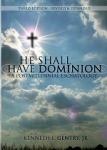
He Shall Have Dominion
(paperback by Kenneth Gentry)
A classic, thorough explanation and defense of postmillennialism (600+ pages). Complete with several chapters answering specific objections.
See more study materials at: www.KennethGentry.com
Christian persecution
In the NT record the Jews are constantly “casting out” Christians either from their synagogues or their cities. And oftentimes for purposes of physical persecution. In his Beatitudes Jesus comforts his followers regarding “when men hate you, and ostracize you, and insult you, and scorn [ekbalōsin] your name as evil, for the sake of the Son of Man” (Lk 6:22). Stephen is “cast out” [ekballō] from Jerusalem before being stoned by the Jews (Ac 7:58). The Jews “drove out” (exebalon) Paul and Barnabas from the city on their first missionary journey (Ac 13:50). The disciples of Christ are constantly having to flee from the Jews (Ac 14:1–6, 19–20; 17:5–9, 13–14; 18:6, 12–17). Before his conversion Paul zealously persecutes believers in Christ in the synagogues and elsewhere (Ac 7:58; 8:1–3; 9:1-9, 21; 22:4–5; 1Co 15:9; Gal 1:13, 23; Php 3:6). John’s Gospel records the fear of the Jews among Christ’s followers during his ministry (Jn 7:13; 19:38; 20:19; cp. 3:1).
Thus, after the Jews spend forty years in efforts to “cast out” believers in Christ, at AD 70 they themselves shall be cast out from God’s presence (Milligan 1903, 180–81). John’s court drama is here implementing the lex talionis. In Dt 19:18–19 God’s law requires that those who press false charges under oath will receive the punishment that would have been due the alleged criminal (cp. Mt 26:60–61). As Rev expresses this irony elsewhere: “Pay her back even as [hōs] she has paid . . . according to her deeds” (18:6). Thus comes the command: “they poured out the blood of saints and prophets, and You have given them blood to drink. They deserve it” (16:6).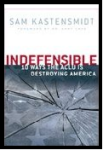
Indefensible (by Sam Kastensmidt)
Sub-title: 10 Ways the ACLU is Destroying America. An Important work in our day of cultural collapse and Christian persecution.
See more study materials at: www.KennethGentry.com
An irony exists in the measuring imagery in 11:1–2. Jesus warns the Jews during him ministry: “Do not judge lest you be judged. For in the way you judge, you will be judged; and by your standard of measure, it will be measured [hō metrō metreite metrēthēsetai] to you” (Mt 7:1–2). Later he informs the chief priests and the Pharisees: “Therefore [dia touto] I say to you, the kingdom of God will be taken away from you, and be given to a nation producing the fruit of it” (Mt 21:43).
Conclusion
It ain’t over, til it’s over. Please catch my next blog for the conclusion to this series.
Click on the following images for more information on these studies:



October 8, 2021
REV 11:2 AND ISRAEL CAST OUT (2)
 PMW 2021-074 by Kenneth L. Gentry, Jr.
PMW 2021-074 by Kenneth L. Gentry, Jr.
In Rev 11:2 we find an important clue to the meaning of the message of Revelation. In this passage we learn that the outer court of the temple is to be cast out. The external court represents the external husk of ancient Judaism, as viewed over against the true essence of Israel. John is here reflecting on Christ’s words in Luke 21:24.
In my last blog article I began a consideration of the significance of the word “cast out” as it applies to the temple’s rejection in AD 70. This is the second installment, highlighting another concept lying behind the image.
Excommunication in Scripture
Scripture employs ekballō for excommunication from one’s faith community (e.g., 3Jn 10). “‘Casting outside’ can also have the nuance of God’s true people who are rejected and persecuted by the unbelieving world” (G. K. Beale). This is important for John in that the Jews are constantly “casting out” Christians either from their synagogues or their cities, as we see in the case of Jesus (Lk 4:29), Stephen (Ac 7:58), and Paul (Ac 13:50). A key issue in Rev is the persecution of believers by the Jews. G. Milligan rightly sees it as “excommunication from the synagogue is in the Seer’s mind,” though he wrongly applies it to “the faithless members of the Christian Church.”
Before Jerusalem Fell
(by Ken Gentry)
Doctoral dissertation defending a pre-AD 70 date for Revelation’s writing. Thoroughly covers internal evidence from Revelation, external evidence from history, and objections to the early date by scholars.
See more study materials at: www.KennethGentry.com
Significantly, the clearest, most detailed, historical example of synagogue excommunication appears in John’s Gospel. There the parents of the blind man whom Jesus heals (Jn 9:1–7) fear (ephobounto) being “put out of the synagogue” (aposunagōgos, v 22). After the Jews confront the man himself, “they put him out” (exabalon auton exō, Jn 9:34–35). John mentions this danger also in Jn 12:42–43 and 16:2, though employing the other, uniquely NT term, aposunagōgos. In 16:2 they believe they are doing God a spiritual service (latreian). Latreia is used of tabernacle/temple service, making it appropriate for our concerns in showing the temple’s judgment (Ro 9:4; Heb 9:1, 6).
Excommunication is particularly significant in that in those days the whole culture and all social relations are governed by ecclesiastical membership. In biblical terms an excommunicant is one who is formally cast outside the boundaries of God’s covenantal love; he is “cut off” from God’s people (Ge 17:14; Lev 7:20; Nu 15:30). Thus, when Jesus speaks of Christian disciplinary procedures within the church, he points out the end result that the excommunicant will “be to you as a Gentile” (Mt 18:17). In 1Co 5:5 Paul speaks of excommunication as delivering one to Satan (showing a conceptual relation to and a reverse image of exorcism). Such ecclesiastical action leads to shunning from one’s community (cf. 2Th 3:14; 1Co 5:2, 13). The problem is quite unlike our modern ecclesiastical anemia where excommunication (if practiced at all) is diluted: excommunicants can simply go to the church next door if they so choose (which would be especially attractive if the new church had a bigger gymnasium).
In fact, excommunication is such a serious matter in ancient Judaism that it can — and often does — involve persecution. “The demise of Jewish membership in the Christian church was hastened by punishment and persecution of Christian Jews within the synagogue, eventually followed by expulsion from the synagogue” (DLNTD). This ecclesiastical exclusion not only involves social ostracizing from family and friends (Mt 10:21, 34-39) but outside the borders of Israel it legally endangers the individual in that “expulsion from the synagogue deprived Christians of the shelter of Judaism and left them vulnerable to the Romans” (C. Setzer). Jesus warns his disciples that in their ministry to Israel they will be dragged before the sunedria (legal courts) and/scourged in the synagogues (Mt 10:16-18). But he promises this persecution will be cut short by his judgment coming against Israel: “But whenever they persecute you in this city, flee to the next; for truly I say to you, you shall not finish going through the cities of Israel, until the Son of Man comes” (Mt 10:23; cp. Rev 1:7; 3:9, 11).
The Book of Revelation Made Easy
(by Ken Gentry)
Helpful introduction to Revelation presenting keys for interpreting. Also provides studies of basic issues in Revelation’s story-line.|
See more study materials at: www.KennethGentry.com
As indicated above, ekballō is used in contexts where people are removed from their homes and social settings. In that exodus imagery is a recurring phenomenon in Rev, it may be significant that in the OT we read of Pharaoh “casting out [ekbalein, LXX]” (Ex 6:1; 11:1; 12:33) the Jews from his “house,” the “house of slavery” (Ex 13:3, 14; 20:2; Dt 5:6; 7:8). Interestingly, the LXX uses this term of the expulsion of the Canaanites from their land and homes as the result of the exodus: “The Lord will drive out [ekbalei] all these nations from before you, and you will dispossess nations greater and mightier than you” (Dt 11:23; cp. Ex 23:28-31; 33:2; 34:11; Dt 11:23; 33:27; Jos 24:12, 18; Jdg 6:9; 1Ch 17:21). The Jews are given “houses” and “cities” they did not build (Dt 6:10-11; 19:1; Jos 24:13). But God warns Israel that she herself will be “cast out” from the land if she disobeys him: “The Lord uprooted them from their land in anger and in fury and in great wrath, and cast [exebalen] them into another land, as it is this day” (LXX Dt 29:28; 2Ki 17:20; Jer 7:15; 52:3). In Rev 11:2 the casting out of the temple itself represents Israel’s being cast off God’s property for her disobedience.
Temple Cleansing
Significantly, at both the beginning (Jn 2:15) and end (Mt 21:12 //) of his ministry, Jesus “cast out” (ekballō) Jews from the temple. In both contexts we have clear allusions to the temple’s coming destruction: After cleansing the temple in Jn 2:15 Jesus publicly declares: “Destroy this temple, and in three days I will raise it up” (Jn 2:19). He is speaking of his body (v 21), of course, but commentators widely agree that this also includes a warning of the temple’s eventual demise. In fact, his statement is surely a double entendre, so that “the spiritual destruction of Israel’s temple occurred decisively at Jesus’ death and resurrection, and its physical demise came finally in AD 70” (Beale).
In the context of his later cleansing in Mt 21:12, he curses the fig tree (vv 19–20) as an enacted parable alluding to Israel’s lack of fruit and her coming demise. Then, Jesus immediately explains that “if you have faith, and do not doubt, you shall not only do what was done to the fig tree, but even if you say to this mountain, ‘Be taken up and cast into the sea,’ it will happen (v 21). Since Mount Zion is the location of the temple (Jer 50:28; Mic 3:12), a number of commentators see this also as indicating the temple’s destruction: “The evident proverbial nature of the saying should not disguise the fact that someone speaking of ‘this mountain’ being cast into the sea, in the context of a dramatic action of judgment in the Temple, would inevitably be heard to refer to Mount Zion” (N. T. Wright).
Jesus’ Parable
Jesus also employs the term ekballō in a parable forewarning the Jews of the coming destruction of the temple. This occurs because they “cast out” (exebalon auton exō) the “heir” (Christ) from the “vineyard” (Israel), even though he was the vineyard owner’s (God’s) son (Mk 12:8; Mt 21:37, 39). Jesus points out the consequences of their action: “What will the owner of the vineyard do? He will come and destroy the vine-growers, and will give the vineyard to others” (Mk 12:9). This occurs when the Romans “tread under foot the holy city” (Rev 11:2b) after it is “cast out” (11:2a). The “Jerusalem below” is in bondage and will be “cast out” (ekbale, Gal 4:30; cp. Philo, Cher 1:3:9).
Because of their lack of covenant faith (Mt 8:10; cp. Ge 15:6; Heb 4:12) the Jews are being “cast out” of God’s kingdom while the Gentiles are entering in: “Many shall come from east and west, and recline at the table with Abraham, and Isaac, and Jacob, in the kingdom of heaven; but the sons of the kingdom shall be cast into the outer darkness [ekblēthēsantai eis to skotos to exōteron]; in that place there shall be weeping and gnashing of teeth” (Mt 8:11-12).
Stay tuned! I continue this study in my next blog.
Click on the following images for more information on these studies:



October 5, 2021
REV 11:2: ISRAEL CAST OUT (1)
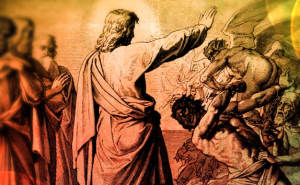 PMW 2021-073 by Kenneth L. Gentry, Jr.
PMW 2021-073 by Kenneth L. Gentry, Jr.
Rev 11:1-2 is an important passage in John’s drama about Israel’s judgment. There John receives a command to actually engage an action in his visionary experience:
“Get up and measure the temple of God and the altar, and those who worship in it. Leave out the court which is outside the temple and do not measure it, for it has been given to the nations; and they will tread under foot the holy city for forty-two months.”
As I argue elsewhere, the “temple of God and the altar” symbolizes the essence of God’s true worship and points to the true Jews (Christian Jews, Rev 2:9; 3:9) and their worship of Christ (Phil 3:3; cp. Rom 2:29; 9:6). And “the court” here is the outer court of the temple, picturing the external matters of the temple. It signifies the actual physical temple which as the heart of Israel represents the old covenant worship of Judaism and its people.
Double-entendre in John
To plumb the depth of this image, we must understand that scholars recognize John’s use of double (and even triple) entendre. According to BAGD 299, scholars recognize “the Johannine love of multiple meaning” (BAGD 299). For instance, in his Gospel we read in Jn 1:5 that the darkness did not “comprehend” the light. The word used here can mean either that the darkness did not overcome the light or the darkness did not understand the light. Both are true. We also see Jesus informing Nicodemus that he must be born “again,” which can also mean be born from “above” (Jn 3:3). “Living water” in Jn 4:10 and 7:38 can mean “running, moving water” or “water that is alive.” In Jn 11:50 the high priest says Jesus must die “for” the nation, which can mean either “in behalf of” or “instead of.” On and on we could go.
by Ken Gentry
A popularly written antidote to dispensational sensationalism and newspaper exegesis. Convincing biblical and historical evidence showing that the Beast was the Roman Emperor Nero Caesar, the first civil persecutor of the Church. The second half of the book shows Revelation’s date of writing, proving its composition as prior to the Fall of Jerusalem in A.D. 70. A thought-provoking treatment of a fascinating and confusing topic.
For more study materials, go to: KennethGentry.com
Such multiple significance is undeniable in Rev 17:9–10 where the beast’s heads represent both seven mountains and seven kings. This practice seems obviously at work locally in that the two witnesses somehow represent both “the two olive trees and the two lampstands” (Rev 11:4) and both Moses and Elijah (Rev 11:5–6).
Double-entendre also appears in Rev 11:2 as one of the more dramatic instances. What does the command to “leave out” mean? The word translated “leave out” here is ekballo, from ex (out of) and ballo (to throw or cast). Remembering that Revelation is speaking of God’s judgment-coming against Israel in AD 70 for her rejecting Christ, we can discern three implied meanings of the term ekballo in this pasage. I will deal with these three meanings in this and the next three articles.
The meaning of “leave out”
The foundational meaning of ekballo is: “force to leave, drive out, expel” (BAGD 299). Though it only occurs here in Revelation, John employs it in John 2:15 of Jesus casting out the money changers from the temple: exebalen ek tou hierou. In Scripture the term is used in three conceptually related ways that are of particular interest for our understanding of Revelation 11:2, each of which is found in the first definition of the term in BAGD.
The three closely related uses of ekballo all signify forceful removal of someone from a home area. As I focus on ekballo I will note that it signifies some forceful expulsion, either by means of exorcism, excommunication, or divorce. Interestingly, each of these ideas is alluded to in Christ’s original commissioning of his original disciples (one of whom is our author, John, Mt 10:2) before he sends them to the “house of Israel” (Mt 10:6): exorcism of demons (10:8, cp. v. 25); excommunication involving persecution (10:17-19, 23, 28, 34); and divorce involving home disruption (Mt 10:21, 35–36).
In this article I will focus on the use of ekballo in demon exorcism.
The idea of demon exorcism
First, Scripture very commonly uses ekballo for casting out demons (e.g., Mt 12:26, 28; Mk 1:34;16:9; cp. Josephus Ant 6:11:2 §211) from where they dwell in men as if in a house (cf. Mt 12:43-44). This is particularly remarkable given that the first woe (the fifth trumpet) has recently brought demons upon the land (9:1–11). Later an angel declares Babylon (Jerusalem) “the dwelling place of demons” (18:2). Thus, this “cast out” language becomes quite relevant to the flow of the drama.
The use of ekballo for demon exorcism is important for at least two reasons:
(1) John repeatedly notes in his Gospel that the Jewish leaders frequently charge Jesus with being in league with the devil and demons (Jn 7:20; 8:48-52; 10:20). In at least one of these cases they are responding to him for his declaring that they do not keep Moses’ Law (Jn 7:19-20). This issue even results in a major exchange with the Jews regarding the signs of the kingdom. They claim he is in league with Beelzebul (Mt 12:22-29; cp. 10:25), which leads to his warning them that the demons he is clearing out of the Land will come back and be seven times worse (Mt 12:43-45).[image error]For more information and to order click here.
" data-image-caption="" data-medium-file="https://postmillennialismtoday.files...." data-large-file="https://postmillennialismtoday.files...." class="alignright size-full wp-image-209" src="https://postmillennialismtoday.files...." alt="Navigating the Book of Revelation: Special Studies on Important Issues" width="99" height="150">Navigating the Book of Revelation (by Ken Gentry)
Technical studies on key issues in Revelation, including the seven-sealed scroll, the cast out temple, Jewish persecution of Christianity, the Babylonian Harlot, and more.
See more study materials at: www.KennethGentry.com
(2) It is also significant in that John (alone among the Gospel writers) records Jesus’ charge that the Jews are of their “father the devil” who is “a liar from the beginning” (Jn 8:44). Jesus effectively repeats this in Rev when he twice calls the Jewish synagogue a “synagogue of Satan” and charges the Jews with lying about their claim (2:9; 3:9). The outpouring of demons on the land in Rev 9 is just as Jesus warns in Mt 12:45b (cf vv. 43-45a). The verb ekballo in Rev 11:2 echoes Christ’s concern in a startling way: Whereas he cast out demons, their temple (“your house,” Mt 23:38) is to be cast out itself.
Demon exorcism is an important element in Jesus’s ministry in Israel in that his kingdom is invading Satan’s. He specifically commissions his disciples to cast out demons (Mt 10:1, 8) when they are sent into Israel (Mt 10:5-6). In that context he speaks of those Jewish cities rejecting his disciples and their exorcism ministry, warning: “Truly I say to you, it will be more tolerable for the land of Sodom and Gomorrah in the day of judgment, than for that city” (Mt 10:15). Interestingly, our context calls Jerusalem “Sodom” (11:8). In that Israel is in league with Satan, she herself will be cast out (as represented here by the outer court of her temple being cast out).
Interestingly, a major back-theme in Rev is the demise of Satan (e.g., 12:9; 20:2, 10), while John focuses on Israel’s judgment (1:7). In his Gospel we read Jesus associating Satan’s overthrow with his own death, which the Jews cause (Jn 19:6-7, 11-12, 15). Despite the evil effort of Satan and Israel, Christ’s death will lead to a new era in which “all men” — not Jews alone — will be drawn to Christ: “Now judgment is upon this world; now the ruler of this world shall be cast out [ekblethesetai exo]. And I, if I be lifted up from the earth, will draw all men to Myself” (Jn 12:31-32; cp. exposition of Rev 7:9ff). The casting out of the temple (11:2) is spoken of in similar terms. Again, instead of demons being cast out of the Jews, their beloved temple will be cast out from the world and from God’s presence.
Thus, it seems John’s double-entendre here involves Israel’s being cast out of her temple as if by means of demon exorcism. But there is more! See you soon.

October 1, 2021
GOD’S SOVEREIGNTY; OUR HOPE (3)
 PMW 2021-072 by Kenneth L. Gentry, Jr.
PMW 2021-072 by Kenneth L. Gentry, Jr.
This is the last in a three-part series that is basically citing verses demonstrating God’s sovereignty over the affairs of the world. It is important that postmillennialists always bear in mind that, no matter what the current external circumstances may suggest, God is in control He sovereignly ordains whatsoever comes to pass. He graciously and sovereignly saves sinners; and he will continue to do so until this world is overwhelmed by the presence of his grace-filled people.
In this series I am basically citing one Scripture after another in demonstration of God’s marvelous sovereignty. God’s word is more compelling than mine in expressing the postmillennial hope. And his word’s statements on his sovereign and gracious power should encourage us to recognize that he has a plan that he intends to fulfill by his almighty power.
God’s Predestinating Counsel
Thine eyes have seen my unformed substance; / And in Thy book they were all written, / The days that were ordained for me, / When as yet there was not one of them. (Psa 139:16)
Remember the former things long past, / For I am God, and there is no other; / I am God, and there is no one like Me, / Declaring the end from the beginning / And from ancient times things which have not been done, / Saying, “My purpose will be established, / And I will accomplish all My good pleasure.” (Isa 46:9–10)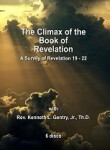
The Climax of the Book of Revelation (Rev 19-22)
Six lectures on six DVDs that introduce Revelation as a whole, then focuses on its glorious conclusion. Provides an important, lengthy Introduction to Revelation also.
See more study materials at: www.KennethGentry.com
For to do whatsoever thy hand and thy counsel determined before to be done. (Acts 4:28)
And when the Gentiles heard this, they were glad, and glorified the word of the Lord: and as many as were ordained to eternal life believed. (Acts 13:48)
We speak God’s wisdom in a mystery, the hidden wisdom, which God predestined before the ages to our glory. (1 Cor 2:7)
Blessed be the God and Father of our Lord Jesus Christ, who has blessed us with every spiritual blessing in the heavenly places in Christ, just as He chose us in Him before the foundation of the world, that we should be holy and without blame before Him in love, having predestined us to adoption as sons by Jesus Christ to Himself, according to the good pleasure of His will, to the praise of the glory of His grace, by which He made us accepted in the Beloved. (Eph 1:3–5)
In Him also we have obtained an inheritance, being predestined according to the purpose of Him who works all things according to the counsel of His will. (Eph 1:12)
According to the eternal purpose which he purposed in Christ Jesus our Lord. (Eph 3:11)
For whom he did foreknow, he also did predestinate to be conformed to the image of his Son, that he might be the firstborn among many brethren. Moreover whom he did predestinate, them he also called: and whom he called, them he also justified: and whom he justified, them he also glorified. (Rom 8:29–30)
He has saved us, and called us with a holy calling, not according to our works, but according to His own purpose and grace which was granted us in Christ Jesus from all eternity. (2 Tim 1:9)
For there are certain men crept in unawares, who were before of old ordained to this condemnation, ungodly men, turning the grace of our God into lasciviousness, and deny–ing the only Lord God, and our Lord Jesus Christ. (Jude 4)
God’s Choosing for Salvation
Then the King will say to those on His right, ‘Come, you who are blessed of My Father, inherit the kingdom prepared for you from the foundation of the world.’ (Matt 25:34)
Who shall lay any thing to the charge of God’s elect? It is God that justifieth. (Rom 8:33)
For the children being not yet born, neither having done any good or evil, that the purpose of God according to election might stand, not of works, but of him that calleth. (Rom 9:11)
Even so then at this present time also there is a remnant according to the election of grace. . . . What then? Israel hath not obtained that which he seeketh for; but the election hath obtained it, and the rest were blinded (according as it is written, God hath given them the spirit of slumber, eyes that they should not see, and ears that they should not hear) unto this day. (Rom 11:5, 7–8)
Knowing, brethren beloved, your election of God. (1 Thess 1:4)
But we should always give thanks to God for you, brethren beloved by the Lord, because God has chosen you from the beginning for salvation through sanctification by the Spirit and faith in the truth. (2 Thess 2:13)
I charge thee before God, and the Lord Jesus Christ, and the elect angels, that thou observe these things without preferring one before another, doing nothing by partiality. (1 Tim 5:2)
Paul, a servant of God, and an apostle of Jesus Christ, according to the faith of God’s elect, and the acknowledging of the truth which is after godliness; in hope of eternal life, which God, that cannot lie, promised before the world began. (Tit 1:1–2)
Elect according to the foreknowledge of God the Father, through sanctification of the Spirit, unto obedience and sprinkling of the blood of Jesus Christ: Grace unto you, and peace, be multiplied. (1 Pet 1:20)
The church that is at Babylon, elected together with you, saluteth you; and so doth Marcus my son. (1 Pet 5:13)
Wherefore the rather, brethren, give diligence to make your calling and election sure: for if ye do these things, ye shall never fall. (2 Pet 1:10)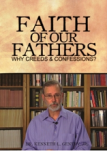
Faith of Our Fathers (DVDs by Ken Gentry)
Explains the point of creeds for those not familiar with their rationale.
Also defends their biblical warrant and practical usefulness.
See more study materials at: www.KennethGentry.com
Conclusion
Though I did not expound the teaching of these verses, we can at least see that the notion of God’s absolute sovereignty is abundantly displayed in Scripture. A theme appearing that frequently and in such a wide range of passages employing such an array of terms shows that it is not some side issue in the Bible. Perhaps opponents of predestination may spin a few verses as a means of countering the doctrine, but they will become quite dizzy if they attempt to spin such a great mass of evidence.
Have hope, postmillennialists! Our God reigns!
Click on the following images for more information on these studies:



September 28, 2021
GOD’S SOVEREIGNTY; OUR HOPE (2)
 PMW 2021-071by Kenneth L. Gentry, Jr.
PMW 2021-071by Kenneth L. Gentry, Jr.
This is the second in a brief series on God’s sovereignty as our hope for the gospel’s conquering the world for Christ. I am writing this to encourage postmillennialists to maintain their hope in Scripture’s prophecies despite the widespread and increasing collapse of our culture in America.
God has an elect people. And they will grow in number as God sovereignly calls them to himself as history unfolds. Once again, the Scriptures are clear: God sovereign calls and saves sinners in his own time according to his own plan. Let us review some Scriptures that speak of God’s sovereign call.
And God said unto Abraham, Let it not be grievous in thy sight because of the lad, and because of thy bondwoman; in all that Sarah hath said unto thee, hearken unto her voice; for in Isaac shall thy seed be called. (Gen 21:12–13)
For thou art an holy people unto the LORD thy God: the LORD thy God hath chosen thee to be a special people unto himself, above all people that are upon the face of the earth. The LORD did not set his love upon you, nor choose you, because ye were more in number than any people; for ye were the fewest of all people: But because the LORD loved you, and because he would keep the oath which he had sworn unto your fathers, hath the LORD brought you out with a mighty hand, and redeemed you out of the house of bondmen, from the hand of Pharaoh king of Egypt. (Deut 7:6–8)
Blessed is the nation whose God is the LORD, / The people whom he hath chosen for his own inheritance. (Psa 33:12)
THE APOCALYPSE
by Milton S. Terry
This book is Terry’s preterist commentary on the Book of Revelation. It was originally the last half of his much larger work, Biblical Apocalyptics. It is deeply-exegetical, tightly-argued, and clearly-presented.
See more study materials at: www.KennethGentry.com
How blessed is the one whom Thou dost choose, and bring near to Thee, / To dwell in Thy courts. / We will be satisfied with the goodness of Thy house, / Thy holy temple. (Psa 65:4)
All things have been handed over to Me by My Father; and no one knows the Son, except the Father; nor does anyone know the Father, except the Son, and anyone to whom the Son wills to reveal Him. (Matt 11:27)
So the last shall be first, and the first last: for many be called, but few chosen. (Matt 20:16)
Shall not God bring about justice for His elect, who cry to Him day and night, and will He delay long over them? (Luke 18:7)
All that the Father gives Me will come to Me, and the one who comes to Me I will by no means cast out. (John 6:37)
And this is the Father’s will which hath sent me, that of all which he hath given me I should lose nothing, but should raise it up again at the last day. (John 6:39)
No man can come to me, except the Father which hath sent me draw him: and I will raise him up at the last day. (John 6:44)
I speak not of you all: I know whom I have chosen: but that the scripture may be fulfilled, He that eateth bread with me hath lifted up his heel against me. (John 13:18)
You did not choose Me, but I chose you and appointed you that you should go and bear fruit. (John 15:16a)
If ye were of the world, the world would love his own: but because ye are not of the world, but I have chosen you out of the world, therefore the world hateth you. (John 15:19)
Jesus spoke these words, lifted up His eyes to heaven, and said: Father, the hour has come. Glorify Your Son, that Your Son also may glorify You, as You have given Him authority over all flesh, that He should give eternal life to as many as You have given Him. (John 17:1–2)
I have manifested thy name unto the men which thou gavest me out of the world: thine they were, and thou gavest them me; and they have kept thy word. . . . I pray for them: I pray not for the world, but for them which thou hast given me; for they are thine. (John 17:6, 9)
For the promise is unto you, and to your children, and to all that are afar off, even as many as the Lord our God shall call. (Acts 2:39)
Now when the Gentiles heard this, they were glad and glorified the word of the Lord. And as many as had been appointed to eternal life believed. (Acts 13:48)
And he said, “The God of our fathers hath chosen thee, that thou shouldest know his will, and see that Just One, and shouldest hear the voice of his mouth.” (Acts 22:14)
Amillennialism v. Postmillennialism Debate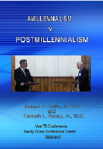
(DVD by Gentry and Gaffin)
Formal, public debate between Dr. Richard Gaffin (Westminster Theological Seminary)
and Kenneth Gentry at the Van Til Conference in Maryland.
See more study materials at: www.KennethGentry.com
(For the children not yet being born, nor having done any good or evil, that the purpose of God according to election might stand, not of works but of Him who calls), it was said to her, “The older shall serve the younger.” As it is written, “Jacob I have loved, but Esau I have hated.” What shall we say then? Is there unrighteousness with God? Certainly not! For He says to Moses, “I will have mercy on whomever I will have mercy, and I will have compassion on whomever I will have compassion.” So then it is not of him who wills, nor of him who runs, but of God who shows mercy. For the Scripture says to Pharaoh, “For this very purpose I have raised you up, that I may show My power in you, and that My name may be declared in all the earth.” Therefore He has mercy on whom He wills, and whom He wills He hardens. You will say to me then, “Why does He still find fault? For who has resisted His will?” But indeed, O man, who are you to reply against God? Will the thing formed say to him who formed it, “Why have you made me like this?” Does not the potter have power over the clay, from the same lump to make one vessel for honor and another for dishonor? What if God, wanting to show His wrath and to make His power known, endured with much longsuffering the vessels of wrath prepared for destruction, and that He might make known the riches of His glory on the vessels of mercy, which He had prepared beforehand for glory. (Rom 9:11–23)
What then? That which Israel is seeking for, it has not obtained, but those who were chosen obtained it, and the rest were hardened. (Rom 11:7)
For ye see your calling, brethren, how that not many wise men after the flesh, not many mighty, not many noble, are called: But God hath chosen the foolish things of the world to confound the wise; and God hath chosen the weak things of the world to confound the things which are mighty; and base things of the world, and things which are despised, hath God chosen, yea, and things which are not, to bring to nought things that are: That no flesh should glory in his presence. (1 Cor 1:26–29)
But we speak the wisdom of God in a mystery, even the hidden wisdom, which God ordained before the world unto our glory. (1 Cor 2:7)
For to you it has been granted for Christ’s sake, not only to believe in Him, but also to suffer for His sake. (Phil 1:29)
It is God who is at work in you, both to will and to work for His good pleasure. (Phil 2:13)
Put on therefore, as the elect of God, holy and beloved, bowels of mercies, kindness, humbleness of mind, meekness, longsuffering. (Col 3:12)
Knowing, brethren beloved by God, His choice of you; for our gospel did not come to you in word only, but also in power and in the Holy Spirit and with full conviction; just as you know what kind of men we proved to be among you for your sake. (1 Thess 1:4–5)
That ye would walk worthy of God, who hath called you unto his kingdom and glory. (1 Thess 2:12)
For God has not destined us for wrath, but for obtaining salvation through our Lord Jesus Christ. (1 Thess 5:9)
But we are bound to give thanks to God always for you, brethren beloved by the Lord, because God from the beginning chose you for salvation through sanctification by the Spirit and belief in truth, to which He called you by our gospel, for the obtaining of the glory of our Lord Jesus Christ. (2 Thess 2:13, 14)
Who has saved us and called us with a holy calling, not according to our works, but according to His own purpose and grace which was given to us in Christ Jesus before time began. (2 Tim 1:9)
And all that dwell upon the earth shall worship him, whose names are not written in the book of life of the Lamb slain from the foundation of the world. (Rev 13:8)
The beast that you saw was, and is not, and will ascend out of the bottomless pit and go to perdition. And those who dwell on the earth will marvel, whose names are not written in the Book of Life from the foundation of the world, when they see the beast that was, and is not, and yet is. (Rev 17:8)
With such a God, how can we lose hope? God is at work in you and in this world.
Click on the following images for more information on these studies:



September 24, 2021
GOD’S SOVEREIGNTY; OUR HOPE (1)
 PMW 2021-070 by Kenneth L. Gentry, Jr.
PMW 2021-070 by Kenneth L. Gentry, Jr.
We live in an era of wholesale moral, cultural, and moral collapse. Our nation was founded on Christian principle, but today we are witnessing the ever quickening collapse of our society. And I say this as a postmillennialist. Is there any hope for our future?
The answer, of course, is: “Yes!” We must still maintain the postmillennial hope flowing out of biblical prophecy. And we may do so because the God of hope is a sovereign Lord. The Scriptures are abundantly clear that he is the absolute sovereign who is in ultimate control of history. Postmillennialists need to be apprised of his sovereignty, so that they may always keep their eyes looking above to him and his sovereign plan.
In this brief series I will be dealing with the sovereignty of God as an essential foundation for the postmillennial hope. Though things currently looking dismal, we must remember: “it ain’t over til it’s over”! Christ has not returned yet, so no one can say on the basis of contemporary historical analysis that postmillennialism is false. And as we recognize this we must remember the Bible’s repeated declarations that God is sovereign. We are encouraged when we look at the plan of God, not when we look at the sinfulness of man.[image error]For more information and to purchase click here.
" data-image-caption="" data-medium-file="https://postmillennialismtoday.files...." data-large-file="https://postmillennialismtoday.files...." class="alignright size-full wp-image-213" src="https://postmillennialismtoday.files...." alt="Predestination Made Easy" >Predestination Made Easy
(by Ken Gentry)
A thoroughly biblical, extremely practical, and impressively clear presentation of
the doctrine of absolute predestination.
See more study materials at: www.KennethGentry.com
The Scriptures declare God’s absolute sovereignty in unmistakable terms. Consider the following powerful assertions.
But indeed for this purpose I have raised you up, that I may show My power in you, and that My name may be declared in all the earth. (Exo 9:16)
And he said, “I will make all my goodness pass before thee, and I will proclaim the name of the LORD before thee; and will be gracious to whom I will be gracious, and will shew mercy on whom I will shew mercy.” (Exo 33:19)
For it was of the LORD to harden their hearts, that they should come against Israel in battle, that he might destroy them utterly, and that they might have no favour, but that he might destroy them, as the LORD commanded Moses. (Josh 11:20)
Then Job answered the Lord, and said, / “I know that Thou canst do all things, / and that no purpose of Thine can be thwarted.” (Job 42:1–2)
Our God is in the heavens; / He does whatever He pleases. (Psa 115:3)
Whatever the Lord pleases, He does, / In heaven and in earth, in the seas and in all deeps. (Psa 135:6)
The LORD hath made all things for himself: yea, even the wicked for the day of evil. (Prov 16:4 KJV)
In his heart a man plans his course, but the Lord determines his steps. (Prov 16:9)
The Lord of hosts has sworn saying, “Surely, just as I have intended so it has happened, and just as I have planned so it will stand, for the Lord of hosts has planned, and who can frustrate it? And as for His stretched-out hand, who can turn it back?” (Isa 14:24, 27)
And who is like Me? Let him proclaim and declare it; / Yes, let him recount it to Me in order, / From the time that I established the ancient nation. / And let them declare to them the things that are coming / And the events that are going to take place. (Isa 44:7)
Declaring the end from the beginning / And from ancient times things which have not been done, / Saying, “My purpose will be established, / And I will accomplish all My good pleasure; / Calling a bird of prey from the east, / The man of My purpose from a far country. / Truly I have spoken; truly I will bring it to pass. / I have planned it, surely I will do it.” (Isa 46:10–11)
Now the word of the Lord came to me saying, / Before I formed you in the womb I knew you, / And before you were born I consecrated you; / I have appointed you a prophet to the nations. (Jer 1:4–5)
If a trumpet is blown in a city will not the people tremble? / If a calamity occurs in a city has not the Lord done it? (Amos 3:6)
At that time Jesus answered and said, “I thank thee, O Father, Lord of heaven and earth, because thou hast hid these things from the wise and prudent, and hast revealed them unto babes. Even so, Father: for so it seemed good in thy sight.” (Matt 11:25–26)
Then shall the King say unto them on his right hand, “Come, ye blessed of my Father, inherit the kingdom prepared for you from the foundation of the world.” (Matt 25:34)
And he said, “Unto you it is given to know the mysteries of the kingdom of God: but to others in parables; that seeing they might not see, and hearing they might not understand.” (Luke 8:10)
Him, being delivered by the determinate counsel and foreknowledge of God, ye have taken, and by wicked hands have crucified and slain. (Acts 2:23)
For truly in this city there were gathered together against Thy holy servant Jesus, whom Thou didst anoint, both Herod and Pontius Pilate, along with the Gentiles and the peoples of Israel, to do whatever Thy hand and Thy purpose predestined to occur. (Acts 4:27–28)
And [God] hath made of one blood all nations of men for to dwell on all the face of the earth, and hath determined the times before appointed, and the bounds of their habitation. (Acts 17:26)
(book by R. C. Sproul)
From the angels’ revelation of Jesus’ glory to the shepherds outside Bethlehem,
to Jesus’ life-changing revelation of His glory to Paul on the Damascus road, Sproul guides us to a deeper understanding of Christ’s glory.
For more study materials: www.KennethGentry.com
But when it pleased God, who separated me from my mother’s womb, and called me by his grace. . . . (Gal 1:15)
For we are His workmanship, created in Christ for good works, which God prepared before hand that we should walk in them. (Eph 2:10)
Who verily was foreordained before the foundation of the world, but was manifest in these last times for you. (1 Pet 1:20)
With such pronouncements, we must never despair from the railing of man. God is in control; he can and will effect his ultimate plan regardless of the sinfulness of man. Take heart, postmillennialists, in your sovereign Lord. And return for my next installment on “God’s Sovereignty and our Hope.”
Kenneth L. Gentry Jr.'s Blog
- Kenneth L. Gentry Jr.'s profile
- 85 followers



